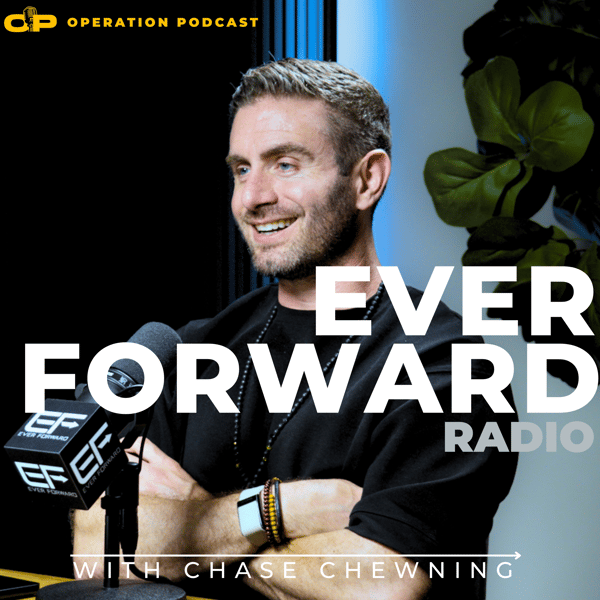EFR 829: The Science of Disaster, the 3 Ways Humans REACT to Fear & How to Master Any Crisis with Amanda Ripley
Ever Forward Radio with Chase Chewning
Chase Chewning
5 • 927 Ratings
🗓️ 26 August 2024
⏱️ 54 minutes
🧾️ Download transcript
Summary
This episode is brought to you by Fatty15, Timeline Nutrition, LMNT, and Manukora.
Discover the three predictable phases of human behavior during disasters and how you can master them to improve your crisis response. Join us with Amanda Ripley, a seasoned journalist and acclaimed author, as she demystifies these stages: denial, deliberation, and the decisive moment. Through Amanda's experiences covering major events like 9/11 and various natural catastrophes, we uncover the surprisingly social and cooperative nature of human behavior under threat.
Follow Amanda @ripleywriter
Follow Chase @chase_chewning
-----
In this episode we discuss...
(08:11) Understanding the Science of Disaster
(10:33) Similarities in Human Behavior Across Disasters
(13:49) Understanding and Overcoming Human Fear Circuits
(18:29) Human Behavior in Disaster Situations
(29:29) Response to Fear Spectrum
(32:32) Stress Response and Tactical Breathing
(37:33) Experiencing and Understanding Disaster Dynamics
(43:22) Building Trust in Disaster Preparation
(48:56) Impact of Social Media on Trust
-----
Episode resources:
- Save 15% on the 90-day starter kit of essential fat C15:0 with code EVERFORWARD at https://www.Fatty15.com/everforward
- Save 10% on MitoPure mitochondrial revitalizer with code EVERFORWARD at https://www.TimelineNutrition.com/everforward
- Save $25 on the manuka honey starter kit with code EVERFORWARD at https://www.Manukora.com/everforward
- Get a FREE variety sample pack of Recharge electrolyte drink mix with any purchase at https://www.DrinkLMNT.com
- Watch and subscribe on YouTube
- Learn more at AmandaRipley.com
Transcript
Click on a timestamp to play from that location
| 0:00.0 | The following is an operation podcast production. |
| 0:04.0 | Can we truly prepare for disaster? |
| 0:07.0 | And if so, what is the best way to become disaster-proof? |
| 0:10.0 | Well, this is funny because when the book, original book came out 16 years ago, I had a different |
| 0:16.1 | answer. How do people and groups behave at the worst of times and what can we learn from that in order to do better. |
| 0:24.8 | The arc of human behavior across all of the things we've talked about is the same three stages. |
| 0:30.8 | Denial followed by deliberation and then the decisive moment which is where |
| 0:35.3 | everything that has happened in those first two stages plays out and you either |
| 0:39.5 | take action or not it's an action that's either wise in retrospect or not. It's an action that's either wise in retrospect or not, right? And a lot of that |
| 0:46.0 | depends on what's happened in the first two phases. So it reminds you that all the time |
| 0:50.8 | your brain is censoring, filtering, sinking input for you and at times of |
| 0:56.8 | extreme duress things can go really haywire. |
| 1:00.4 | You're trying with the training, right, as always to keep, you know this from your military experience, you're trying with the training right as always to keep you know this from your military experience you're trying to keep things in that green zone where it's helpful to you and you don't deteriorate |
| 1:09.0 | So the next crisis we face as a country or as a civilization, the first question should be who's |
| 1:15.6 | been through this before and what do they know. |
| 1:18.1 | For me that's really been very helpful. |
| 1:20.7 | I'm Amanda Ripley, a journalist and the author of The Unthinkable. |
| 1:24.0 | Welcome to Everforward Radio. |
| 1:26.0 | So this brand new study recently came out that may explain why some of us are aging faster than we should, |
| 1:32.0 | resulting in impaired metabolic, liver, and heart health. |
| 1:36.0 | This condition is now called cellular fragility syndrome and it's caused by a deficiency |
| 1:41.1 | in a nutrient called C15. It's been 75 years since the last |
... |
Please login to see the full transcript.
Disclaimer: The podcast and artwork embedded on this page are from Chase Chewning, and are the property of its owner and not affiliated with or endorsed by Tapesearch.
Generated transcripts are the property of Chase Chewning and are distributed freely under the Fair Use doctrine. Transcripts generated by Tapesearch are not guaranteed to be accurate.
Copyright © Tapesearch 2025.

